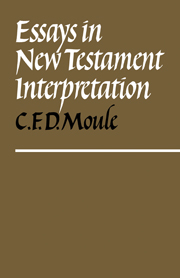Book contents
- Frontmatter
- Contents
- Foreword
- Acknowledgements
- Abbreviations
- Jesus in early Christian interpretation
- Studies in the Gospels
- Two studies in the Epistles
- Two linguistic studies
- Studies exegetical, doctrinal and ethical
- 12 The influence of circumstances on the use of christological terms
- 13 The influence of circumstances on the use of eschatological terms
- 14 St Paul and ‘dualism’: the Pauline conception of resurrection
- 15 A reconsideration of the context of maranatha
- 16 II Cor. iii.18b, καθάπερ ἀπὸ κυρίου πνεύματος
- 17 Punishment and retribution: an attempt to delimit their scope in New Testament thought
- 18 The theology of forgiveness
- 19 Obligation in the ethic of Paul
- 20 ‘…As we forgive…’: a note on the distinction between deserts and capacity in the understanding of forgiveness
- 21 The sacrifice of the People of God
- Index
17 - Punishment and retribution: an attempt to delimit their scope in New Testament thought
Published online by Cambridge University Press: 05 November 2011
- Frontmatter
- Contents
- Foreword
- Acknowledgements
- Abbreviations
- Jesus in early Christian interpretation
- Studies in the Gospels
- Two studies in the Epistles
- Two linguistic studies
- Studies exegetical, doctrinal and ethical
- 12 The influence of circumstances on the use of christological terms
- 13 The influence of circumstances on the use of eschatological terms
- 14 St Paul and ‘dualism’: the Pauline conception of resurrection
- 15 A reconsideration of the context of maranatha
- 16 II Cor. iii.18b, καθάπερ ἀπὸ κυρίου πνεύματος
- 17 Punishment and retribution: an attempt to delimit their scope in New Testament thought
- 18 The theology of forgiveness
- 19 Obligation in the ethic of Paul
- 20 ‘…As we forgive…’: a note on the distinction between deserts and capacity in the understanding of forgiveness
- 21 The sacrifice of the People of God
- Index
Summary
It is likely, I know, that many readers – perhaps most – will find themsevles in disagreement with the radical thesis I am about to present. But my hope is that time will not have been wasted – whatever the conclusions reached – because the thesis leads us in any case to ponder, once more, the very heart of the Gospel.
What I offer for your consideration is the thesis that the word ‘punishment’ and other words related to it (especially ‘retribution’) have, if used in their strictly correct sense, no legitimate place in the Christian vocabulary. The word ‘punishment’ is often loosely applied, it is true, in modern parlance, to suffering inflicted for other purposes – disciplinary or deterrent. But for such inflictions I believe that it is an incorrect and misleading term. Similarly, in many places where the notion of punishment (even if not the actual word) appears in the New Testament, careful pondering shows that what is meant is, again, not strictly speaking punishment. There is no denying, however, that there are further passages in the New Testament where the idea of retribution is most definitely and deliberately intended. But here, I would dare to say, the essentially personal character of the Christian gospel is temporarily obscured. In other words, what I want to ask is whether suffering inflicted for disciplinary and deterrent purposes (which are entirely relevant to the gospel) is not too lightly confused with suffering inflicted for the purposes of punishment and retribution, so that the latter have been dragged into a Christian context where they do not properly belong.
- Type
- Chapter
- Information
- Essays in New Testament Interpretation , pp. 235 - 249Publisher: Cambridge University PressPrint publication year: 1982



